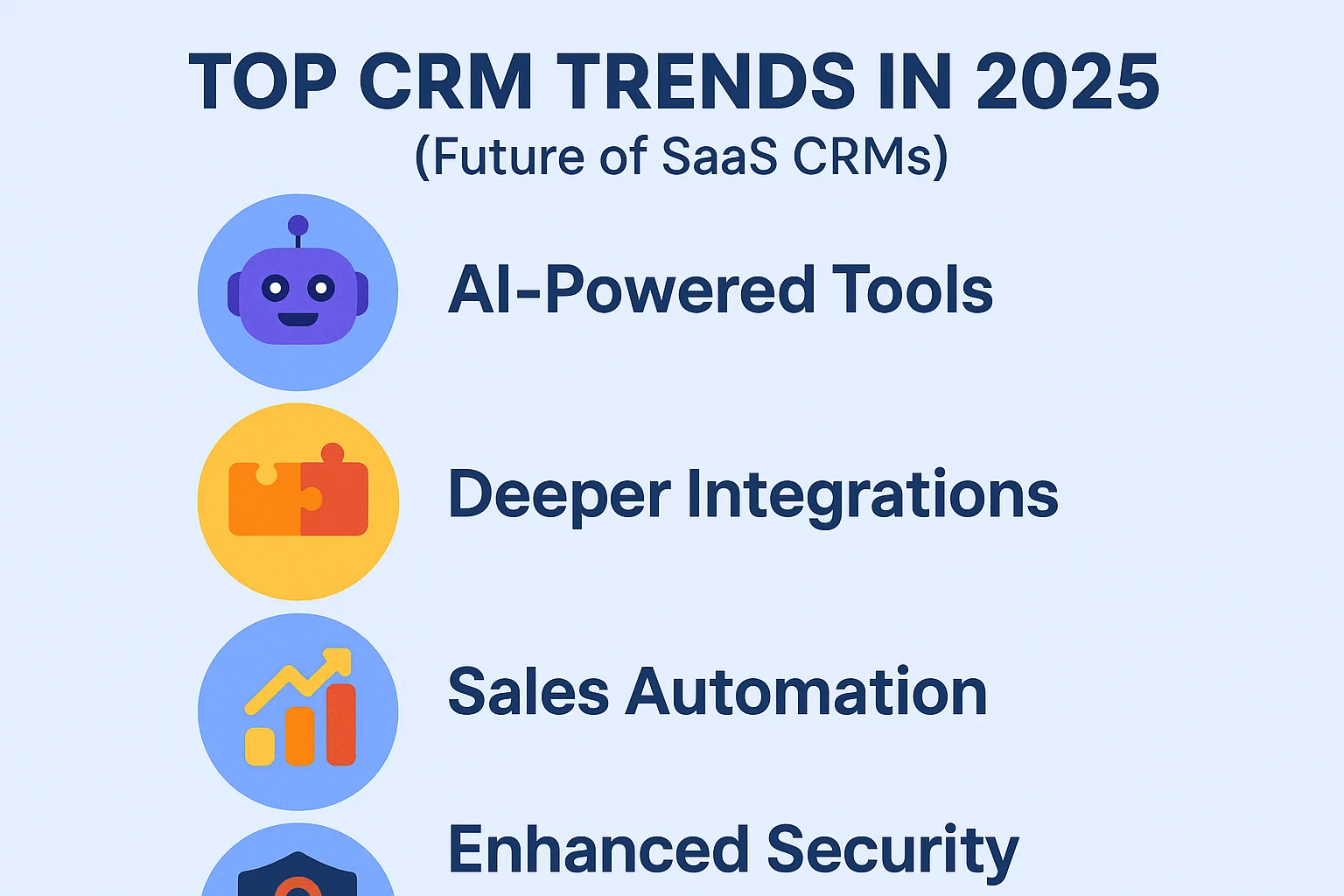Top CRM Trends in 2025 (Future of SaaS CRMs)

Top CRM Trends in 2025: The Future of SaaS CRMs
Customer Relationship Management (CRM) software has evolved dramatically over the past decade. With businesses increasingly relying on SaaS platforms, 2025 promises even more innovation in CRM technology. From AI-powered automation to hyper-personalized customer experiences, understanding the upcoming CRM trends is essential for businesses looking to stay competitive.
1. AI & Machine Learning in CRM
Artificial Intelligence (AI) and Machine Learning (ML) are no longer optional for modern CRMs. In 2025, we see:
- Predictive Analytics: CRMs will forecast sales opportunities, churn risk, and customer lifetime value using advanced algorithms.
- Automated Data Entry: AI will minimize manual input, keeping customer profiles up-to-date automatically.
- Smart Lead Scoring: Machine learning models will prioritize leads based on historical behavior and engagement.
- AI Chatbots: Intelligent chatbots will handle first-level support, lead qualification, and personalized recommendations.
2. Hyper-Personalization & Customer Experience
CRMs are shifting focus from mere data storage to delivering meaningful, personalized experiences:
- Segmented marketing based on behavioral analytics.
- Dynamic content and communication tailored to individual customer preferences.
- Integrated omnichannel communication including email, chat, social media, and SMS.
3. Integration of CRM with Other SaaS Platforms
The future of CRM lies in seamless integration:
- CRM + ERP: Unified systems for finance, sales, and operations.
- CRM + Marketing Automation: Automated campaigns triggered by CRM insights.
- CRM + E-commerce: Customer purchasing patterns feeding directly into CRM for better targeting.
- CRM + Analytics Tools: Real-time dashboards and business intelligence for data-driven decision-making.
4. Mobile-First CRM Platforms
With remote work and on-the-go sales teams, mobile-first CRMs are increasingly important:
- Full-featured apps on iOS and Android.
- Offline access with data synchronization when back online.
- Push notifications for tasks, follow-ups, and deal updates.
5. Enhanced Automation & Workflow Management
Automation will continue to be a key differentiator:
- Automatic lead assignment and routing.
- Workflow templates for repetitive business processes.
- Automated reporting, reducing manual administrative work.
6. Data Security & Privacy Compliance
With GDPR, CCPA, and other regulations, CRM platforms are focusing on security and compliance:
- Enhanced data encryption and access controls.
- Audit trails to track data changes.
- Consent management for customer communications.
7. Predictive & Prescriptive Analytics
CRMs are evolving from descriptive analytics to predictive and prescriptive insights:
- Forecast future sales trends.
- Recommend actions to improve customer retention and engagement.
- Identify cross-selling and upselling opportunities automatically.
8. Voice & Conversational CRM
Voice assistants and natural language processing will enhance CRM usability:
- Voice commands to access customer info and create tasks.
- Conversational AI for lead qualification and follow-ups.
- Integration with smart speakers and mobile voice interfaces.
9. Subscription & SaaS-Based CRM Growth
Cloud SaaS CRMs will dominate, offering benefits like:
- Lower upfront costs and scalable subscription models.
- Automatic updates and feature improvements.
- Multi-tenant architectures supporting small to enterprise businesses.
10. CRM Analytics & ROI Measurement
Businesses increasingly demand ROI tracking from CRM investments:
- Track revenue per lead, deal, and customer segment.
- Measure efficiency of automation and AI workflows.
- Optimize sales strategies with actionable insights.
| Trend | Description | Impact on Business |
|---|---|---|
| AI & ML | Predictive analytics, smart lead scoring, AI chatbots | Improved conversion rates, time savings, smarter decision-making |
| Hyper-Personalization | Tailored experiences based on customer behavior | Higher engagement, better retention |
| CRM Integrations | Seamless connection with ERP, marketing, e-commerce platforms | Streamlined workflows, better data visibility |
| Mobile-First | Full-featured mobile apps with offline access | Remote productivity, faster response times |
| Automation | Workflow automation, automated reporting, lead assignment | Time savings, reduced human errors |
| Data Security | Encryption, access control, compliance with GDPR/CCPA | Improved trust, reduced regulatory risk |
| Predictive & Prescriptive Analytics | Forecasting and actionable insights | Optimized sales, marketing, and customer strategies |
Conclusion
The future of CRM in 2025 is shaped by AI, automation, and seamless SaaS integrations. Businesses adopting these trends will see improved efficiency, better customer relationships, and higher revenue. Staying ahead requires understanding these innovations and selecting a CRM platform that embraces AI, mobility, and personalization while maintaining data security.
FAQs
1. Which CRM trends are most important in 2025?
AI-driven automation, hyper-personalization, mobile-first platforms, and SaaS integrations are critical trends shaping CRM in 2025.
2. How does AI improve CRM functionality?
AI helps with predictive analytics, smart lead scoring, automated data entry, and AI-powered chatbots, enhancing efficiency and decision-making.
3. Are SaaS CRMs better than on-premise in 2025?
SaaS CRMs provide scalability, lower upfront costs, automatic updates, and better integrations, making them the preferred choice for most businesses.
4. How can CRMs improve customer experience?
By delivering hyper-personalized communications, tracking preferences, and automating interactions, CRMs help create superior customer experiences.
5. How do businesses measure CRM ROI?
Through analytics dashboards, tracking revenue per lead, customer retention, efficiency of automation, and overall improvement in sales and marketing outcomes.
Comments (3)